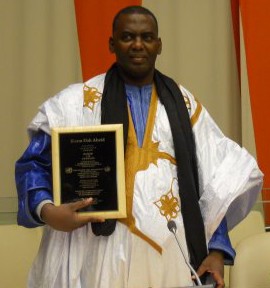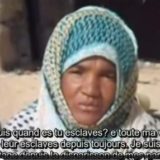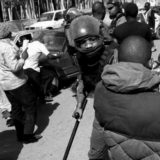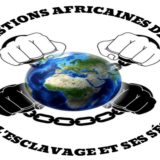Un expert des droits de l’homme exhorte le Parlement à rejeter le projet de loi relatif aux ONGs qui menace la société civile
L’expert des droits de l’homme s’est, en outre, déclaré vivement préoccupé par l’absence de consultation avec la société civile avant l’élaboration des amendements au projet de loi sur les associations les fondations et les réseaux d’associations, en contradiction avec les standards internationaux. « Le Gouvernement mauritanien devrait considérer la société civile comme un partenaire clé dans le processus de réforme. »
« Une loi qui met en place des procédures obligatoires ‘d’autorisation préalable’ des associations, au lieu d’un simple processus de ‘notification préalable’, risque d’entraver le travail de la société civile en Mauritanie », a-t-il estimé.
M. Kiai a indiqué qu’ « une procédure de notification qui accorde automatiquement la personnalité juridique aux associations pour qu’elles puissent opérer est plus conforme au droit international des droits de l’homme et devrait être adoptée par tous les Etats, y compris la Mauritanie. » Le droit à la liberté d’association protège également les associations qui ne sont pas enregistrées, a également précisé l’expert.
Le Rapporteur spécial a également averti que si elle venait à être adoptée, « cette loi instituerait des sanctions sévères basées sur des dispositions formulées en des termes vagues et limiterait le champ d’action des associations au seul domaine du développement. »
M. Kiai a exhorté la Mauritanie à aligner sa législation sur les meilleures pratiques émanant des normes et standards internationaux en matière de droits de l’homme, avant l’examen de la situation des droits de l’homme dans le pays par l’Examen Périodique Universel du Conseil des Droits de l’Homme en novembre 2015.
« Dans cette optique, je suis prêt à offrir une assistance technique à la fois au gouvernement et aux législateurs », a noté l’expert.
Cette déclaration a été endossée par deux autres experts indépendants, notamment le Rapporteur spécial sur la liberté d’opinion et d’expression, M. David Kaye, et le Rapporteur spécial sur la situation des défenseurs des droits de l’homme, M. Michel Forst.
M. Maina Kiai (Kenya) est entré en fonction en tant que premier Rapporteur spécial des Nations Unies sur les droits à la liberté de réunion pacifique et d’association en mai 2011. M. Kiai a été le Directeur exécutif du Conseil international sur les politiques des droits humains, Directeur du programme Afrique d’Amnesty International et directeur Afrique du International Human Rights Law Group (aujourd’hui Global Rights).
Les rapporteurs spéciaux font partie de ce qui est désigné sous le nom des procédures spéciales du Conseil des droits de l’homme. Les procédures spéciales, l’organe le plus important d’experts indépendants du système des droits de l’homme de l’ONU, est le terme général appliqué aux mécanismes d’enquête et de suivi indépendants du Conseil qui s’adressent aux situations spécifiques des pays ou aux questions thématiques partout dans le monde. Les experts des procédures spéciales travaillent à titre bénévole; ils ne font pas partie du personnel de l’ONU et ils ne reçoivent pas de salaire pour leur travail. Ils sont indépendants des gouvernements et des organisations et ils exercent leurs fonctions à titre indépendant. Pour en savoir plus :
Liberté de réunion pacifique et d’association: http://www.ohchr.org/FR/Issues/AssociationReunionPacifique/Pages/SRFreedomAssemblyAssociationIndex.aspx
Défenseurs des droits de l’homme: http://www.ohchr.org/FR/Issues/SRHRDefenders/Pages/SRHRDefendersIndex.aspx
Liberté d’opinion et d’expression: http://www.ohchr.org/FR/Issues/FreedomOpinion/Pages/OpinionIndex.aspx
ONU Droits de l’Homme, Page de pays – Mauritanie: http://www.ohchr.org/FR/countries/MENARegion/Pages/MRIndex.aspx
Pour des informations additionnelles et des demandes des médias, prière de contacter Mme. Karen Blanc (+41 22 917 94 00 / kblanc@ohchr.org et freeassembly@ohchr.org)
Pour les demandes des médias relatives à d’autres experts indépendants des Nations Unies :
Xabier Celaya – Unité média (+ 41 22 917 9383 / xcelaya@ohchr.org)
ONU Droits de l’homme, suivez-nous sur les réseaux sociaux :
Facebook: https://www.facebook.com/unitednationshumanrights
Twitter: http://twitter.com/UNrightswire
Google+ gplus.to/unitednationshumanrights
YouTube: http://www.youtube.com/UNOHCHR
Regardez l’Index universel des droits de l’homme : http://uhri.ohchr.org/fr/
GENEVA (10 August 2015) – The United Nations Special Rapporteur on the rights to freedoms of peaceful assembly and of association, Maina Kiai, today called upon the Mauritanian Parliament to reject the draft law on associations approved by the Council of Ministers last month without public consultations.
« While I support Mauritania’s efforts to reform and improve laws that govern the work of civil society, I am concerned that the bill, as it stands, threatens the exercise of fundamental freedoms in the country, in particular the right to freedom of association, » Mr. Kiai said.
The human rights expert further voiced particular concern about the lack of civil society consultation ahead of the elaboration of the recently amended draft Law on associations, foundations and networks of associations, which is not in line with international standards. « The Mauritanian Government should view civil society as a key partner in the process of reform. »
« Legislation that enshrines mandatory procedures for the ‘prior authorization’ of associations, instead of a simple process of ‘prior notification’, risks hindering the work of civil society in Mauritania, » he said.
Instead, Mr. Kiai stated, « a prior notification process that automatically attributes an association the legal personality to function is in greater conformity with international human rights law and should be adopted by all States, including Mauritania. » The expert added, nonetheless, that the right to freedom of association equally protects associations that are not registered.
The Special Rapporteur also warned that, if adopted, « the law would provide strict punishments for vaguely worded provisions and would limit the scope of an association to the field of development work. »
Mr. Kiai urged Mauritania to align its legislation with the best practices emanating from international human rights norms and standards, ahead of the examination of the country’s human rights record by the Universal Periodic Review of the Human Rights Council in November 2015.
« I stand ready to offer technical assistance to both the Government and legislators in this endeavor, » the expert noted.
Mr. Kiai’s present appeal has been endorsed by two other independent experts, notably the Special Rapporteur on the promotion and protection of the right to freedom or opinion and expression, David Kaye and Special Rapporteur on the situation of human rights defenders, Michel Forst.
ENDS
Mr. Maina Kiai (Kenya) was designated by the UN Human Rights Council as the first Special Rapporteur on the rights to freedom of peaceful assembly and of association in May 2011. Mr. Kiai has been the Executive Director of the International Council on Human Rights Policy, Director of Amnesty International’s Africa Programme, and the Africa Director of the International Human Rights Law Group (now Global Rights).
The Special Rapporteurs are part of what is known as the Special Procedures of the Human Rights Council. Special Procedures, the largest body of independent experts in the UN Human Rights system, is the general name of the Council’s independent fact-finding and monitoring mechanisms that address either specific country situations or thematic issues in all parts of the world. Special Procedures’ experts work on a voluntary basis; they are not UN staff and do not receive a salary for their work. They are independent from any government or organization and serve in their individual capacity. Learn more, log on to:
Freedom of peaceful assembly and of association: http://www.ohchr.org/EN/Issues/AssemblyAssociation/Pages/SRFreedomAssemblyAssociationIndex.aspx
Human rights defenders: http://www.ohchr.org/EN/Issues/SRHRDefenders/Pages/SRHRDefendersIndex.aspx
Freedom of opinion and expression: http://www.ohchr.org/EN/Issues/FreedomOpinion/Pages/OpinionIndex.aspx
UN Human Rights, Country Page – Mauritania: http://www.ohchr.org/EN/Countries/MENARegion/Pages/MRIndex.aspx
For more information and media requests please contact Ms. Karen Blanc (+41 22 917 94 00 / kblanc@ohchr.org and freeassembly@ohchr.org)
For media inquiries related to other UN independent experts:
Xabier Celaya, UN Human Rights – Media Unit (+ 41 22 917 9383 / xcelaya@ohchr.org)
UN Human Rights, follow us on social media:
Facebook: https://www.facebook.com/unitednationshumanrights
Twitter: http://twitter.com/UNrightswire
Google+ gplus.to/unitednationshumanrights
YouTube: http://www.youtube.com/UNOHCHR
Check the Universal Human Rights Index: http://uhri.ohchr.org/en




